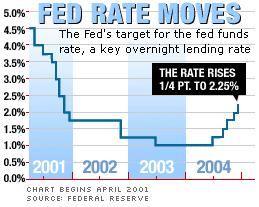NEW YORK (CNN/MONEY) - Inflation is under control and that should mean that the Fed only will need to raise interest rates a couple more times in 2005 before pausing, right?
Not so fast. Some market observers think the weak dollar could play a bigger role in the Fed's interest rate decisions next year.
So far, inflation has not been a major problem. Data from November showed only modest rises in consumer goods and wholesale prices. With energy prices subsiding lately, that has eased inflationary fears as well.
But the euro has gained about 5 percent against the dollar this year while the Japanese yen has risen about 3 percent. John Lynch, chief market analyst with Evergreen Investments, said the dollar should stabilize in 2005 but that there probably won't be any significant improvement in its value until 2006.
If the dollar remains relatively weak, that could cause inflation to creep up since it would make the price of imported goods more expensive.
"Part of the reason we see inflation rising next year is the dollar. Clearly, there is upward pressure on prices because of the falling dollar," said David Joy, capital markets strategist with American Express Financial Advisors.
That's something the Fed would want to nip in the bud.
"The depreciation of the dollar seemed to be having a muted effect on import prices to date. However, upside risks to the inflation outlook included possible further depreciation of the dollar," the Fed said in the minutes of its November policy meeting, released last week.
In other words, the trend bears watching.
"Dollar depreciation is good assuming it is taking place in an orderly manner," said Sung Won Sohn, chief economist at Wells Fargo. "The concern is any precipitous plunge. If that were to happen the Fed would have to raise rates significantly."
Keep an eye on China
The dollar's weakness against the euro and yen might not be the only problem next year. Of even greater concern could be what would happen to the dollar if China revalues its currency, the yuan, in order to increase its purchasing power.
There has been talk for some time that the Chinese government would revalue the yuan but there is a growing sense on Wall Street that it might finally actually happen next year.
 |
|
| Could the dollar's weakness cause the Fed to abandon its "measured" pace of rate hikes next year? |
Many believe the yuan would rise against the dollar if it were revalued. That could be even more worrisome from an inflation standpoint, since China is a fairly sizable exporter of consumer goods like sneakers, toys and consumer electronics.
"The big question is China. Consumer goods haven't seen big moves in import prices but that could change if China revalues," said Sheldon Engler, vice president and head of fixed income research with Charles Schwab Investment Management.
But inflation isn't the only dollar-induced issue that could cause the Fed to act more aggressively.
The government reported a record deficit in the current account -- the broadest measure of the country's trade with the rest of the world -- of $164.7 billion for the third quarter Thursday. Although this number was below expectations and only slightly higher than the second quarter, the growing deficit is still a concern since it could lead foreign investors to bail on U.S. assets.
The Fed alluded to this in its meeting minutes, as well. "In foreign exchange markets, the dollar declined appreciably, apparently in part on continuing market concerns about the financing of the U.S. current account deficit."
As such, Engler thinks the trade gap is the bigger wild card in determining how much the Fed might have to raise rates next year.
"Another issue with the weak dollar is there's a chance that foreigners will lose confidence and the Fed will have to react," Engler said, explaining that the Fed would potentially need to raise rates to attract foreign interest in U.S. fixed-income securities.
Market isn't worried yet
Still, others point out that the dollar's woes have yet to slow the rate of foreign investment in U.S. bonds and other fixed income securities and that the dollar would probably have to plummet in order to do so.
"If the dollar was going to impact capital inflows in the U.S., we would have felt it by now," said Gary Wolfer, senior portfolio manager with Univest Wealth Management and Trust.
Even though the Fed has increased short-term rates by a total of 125 basis points since June, the yield on the 10-year Treasury has actually fallen 50 basis points, from about 4.7 percent to 4.2 percent, during the same time frame. There are 100 basis points in one percentage point.
Bond yields fall as the price of the bond rises, so clearly there has been interest in the 10-year during the past few months.
The falling dollar clearly has not caused major alarm bells to go off just yet but Sohn said that some investors are beginning to worry about prolonged weakness in the greenback.
"Foreign investors are becoming a bit more gun shy about buying U.S. assets," Sohn said. "Until the dollar settles down, we are going to be looking at volatility in the foreign exchange markets."
So further declines in 2005 could start to take their toll.
"Few people win if the dollar collapses," said Lynch. "I don't think anyone wants to see that."

|